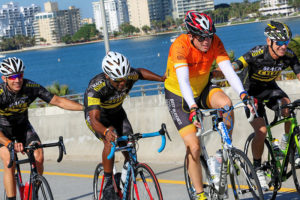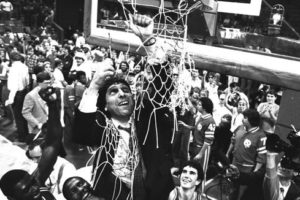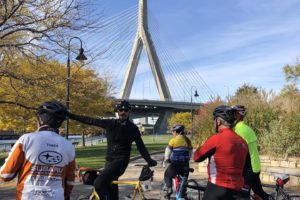Books to Inspire
 Richard Fries is the Director of Cycling Experience for the Best Buddies Challenges. With more than 40 years experience, he has been a racer, commuter, tourist, promoter, advocate, journalist and commentator on the sport and lifestyle of cycling. Having raced at the professional level both in America and Europe, Fries is well known as a race announcer having called countless USA Cycling National Championships, World Cups, and UCI World Championships. But he is also a tireless advocate having recently served as the executive director of MassBike. You can follow him on Strava to learn more.
Richard Fries is the Director of Cycling Experience for the Best Buddies Challenges. With more than 40 years experience, he has been a racer, commuter, tourist, promoter, advocate, journalist and commentator on the sport and lifestyle of cycling. Having raced at the professional level both in America and Europe, Fries is well known as a race announcer having called countless USA Cycling National Championships, World Cups, and UCI World Championships. But he is also a tireless advocate having recently served as the executive director of MassBike. You can follow him on Strava to learn more.
EPIC
(ep·ic /ˈepik/)
adjective
- noting or pertaining to a long poetic composition, usually centered upon a hero, in which a series of great achievements or events is narrated in elevated style;
- resembling or suggesting such poetry;
- heroic; majestic; impressively great.
Of late I’ve had to reflect on why I love cyclists. I certainly can enjoy the company of several different people. I hold my own in conversation in offices and at parties and around coffee shops. But when I encounter an experienced cyclist – regardless of their education, religious background, native language, political bent, gender, sexual orientation or age – I become intensely engaged in conversation. I find this applies regardless of the content of the discussion.
Why?
I boiled this down to the two key attributes cyclists have in greater quantity than most folks I meet: Curiosity and Courage.
You may believe the latter to be about physical courage. While that is a minor component, what really impresses me is that to be a cyclist – especially in America – requires cultural courage. To be a cyclist one chooses to be a minority on the transportation, recreation and cultural landscape. One must be brave to travel alone, subject to the prospect of an amazing array of contingencies on the route that lay ahead, be that a Tuesday night loop or an epic mixed-terrain adventure.
But the former attribute, Curiosity, also drives the cyclist beyond a town boundary, over a summit, beyond a physical limitation, and around corner after corner after corner.
I’ve been fortunate to ride in 2×2 formation amid groups of solid riders through natural surroundings around the globe at a talking pace. And the conversations typically engage me as much as the act of cycling. Hours melt away amid the discussion, which often focuses on great books, films, TED Talks, etc.
As I shelter through a New England winter, I reflected recently on the many great books cyclists read and recommend to one another. While there are some great books about cycling – both fiction and non-fiction – the seasoned rider will typically cite amazing titles on a wealth of topics other than cycling that inspire them during those epic days on the bike.
While waiting for some pipes to thaw, I threw out a call to several cyclists I admire asking for their recommendation of non-cycling books that can truly inspire them as bicycle riders. I sought out regional heroes, world champions, team chefs, mechanics and Tour de France veterans. But I also tapped into veteran adventurers and gurus who engage me with great conversation during long rides here in New England.
Below is a list of great books they recommended with a single-sentence description of each. I’ve endeavored to cluster them into relevant blocks.
But this blog is a call out to the readers for comments and suggestions. Only a third of the books cited came from me. The others came from those cycling gurus whom I admire. I look forward to hearing your feedback via Facebook on these books as well as other suggested readings of books that will fuel our souls during those long rides ahead…hopefully we can ride together.
Pick one. Read it this winter. And apply it to your life, both on and off the bicycle.
Great Books on Transcendence
The Art of War, Sun Tzu
This short Chinese military treatise from the 5th Century BC is often required reading by cycling coaches, given its focus less on fighting and more on strategy in selecting where, when and how to fight.
Zen in the Art of Archery, Eugen Herrigel
Written by a German who studied and taught archery in Japan during the 1920s but not published until 1948, this brief insightful book introduced Zen to Western audiences.
The Inner Game of Tennis, W. Timothy Gallwey
An amazingly accessible book published in the 1970s, this Harvard tennis coach unshackles the superior body self from the inhibited mind self.
Flow, Mihaly Csikszentmihalyi
Written by a Hungarian psychologist whose TED Talk propelled him to notoriety, Flow describes a state of ecstasy achieved by such people as musicians, shepards, blind nuns and especially athletes and the steps taken from the nadir of apathy to the zenith of flow.
The Book of Five Rings, Miyamoto Musashi
One of the most insightful texts on the subtle arts of confrontation and victory to emerge from Asian culture, this book was composed in 1643 by a famed duelist and undefeated samurai.
The Peaceful Warrior’s Way, Dan Millman
The story tells of a chance meeting with a service station attendant who becomes a spiritual teacher on the ways of the “Peaceful Warrior” to the author, then a young gymnast.
Great Books on Nature
Outside Lies Magic, John R. Stilgoe
An advocate for seeing the world at the speed of a bicycle, the author teaches about the acute observation of ordinary things, about becoming aware in everyday places, about seeing in utterly new ways, and about enriching your life unexpectedly.
Walden, Henry David Thoreau
The book that spawned American transcendentalism in 1854, the work is part personal declaration of independence, social experiment, voyage of spiritual discovery, satire and—to some degree—a manual for self-reliance. (I suggest the 150th anniversary edition with glorious photos of the fabled Concord pond.)
Last Child in the Woods, Richard Louv
An illuminating expose on how children, notably Americans, are being raised with a “nature deficit disorder” and the price we all pay for allowing fear to pen us all indoors.
Homo Deus, Yuval Noah Harari
The sequel to the historic book Sapiens, The book outlines how humanity is likely to make a significant attempt to gain happiness, immortality and God-like powers in the 21st Century.
Great Books About Inspirational Characters
Seabiscuit, Laura Hillenbrand
Several sources cited books by Hillenbrand. This story of a legendary racehorse dismissed by experts given his small size and inauspicious early results, unveils how unlikely champions can be revealed only in competition.
Unbroken, Laura Hillenbrand
The heroic story of Olympian-turned-POW Louis Zamperini, this book follows on Hillenbrand’s celebration of the ant-like strengths unveiled under extreme pressure.
Modoc: The True Story of the Greatest Elephant that Ever Lived, Ralph Helfer
This lovely true story about a boy and elephant born on the same hour of the same day use their training and love to overcome shipwrecks, war, dire poverty and barbaric abuse to spend a life together.
Guide Books for Success
Deep Survival, Laurence Gonzales
This amazing collection of stories describes how and why 90 percent of people confronted with life-threatening situations panic and die but 10 percent stay cool, focused and alive.
No Shortcuts to the Top, Ed Viesturs with David Roberts
A renowned climber who has scaled the world’s highest mountains, this book – reinforcing the mantra “Reaching the summit is optional; getting down is mandatory” – is about the overly cautious author being torn between the flat, safe world he and his loved ones share and the majestic and deadly places where only he can go.
The Champions Way, Dr. Steve Victorson with Robert Yehling
This book, through more than 60 interviews, reveals how the best competitors on the planet get there by relying on 11 specific qualities all champions master.
Why We Run: A Natural History, Berndt Heinrich
Detailing how different animals use their natural advantages for greatest endurance, this book set the foundation for the “Persistent Hunter” theories on how humans, borrowing lessons from those animals, can unlock their natural mechanisms to achieve great things.




